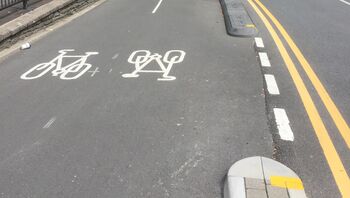Template:Cs:Map Features:cycleway
Jump to navigation
Jump to search
Cyklostezky (Cycleway)
Popis infrastruktury určené převážně pro cyklisty. Tyto značky jsou přidávány k již existující cestě highway=*. Pro samostatně kreslenou cyklostezku použijte highway=cycleway. Viz také Bicykly a Cycle routes(en).
| Hodnota | Prvek | Popis | Ilustrace | |||
|---|---|---|---|---|---|---|
Dedicated bicycle lanes | ||||||
| lane | Na silnici je vyhrazený pruh pro cyklisty v obou směrech (v jednosměrce pouze jedním souhlasným směrem) (značky IP20a a V14). | |||||
|
| ||||||
| shared_lane | Cyklisté sdílí jízdní pruh s motoristy a na silnici je to vyznačeno značkou V20. | |||||
| share_busway | Na silnici je vyhrazený pruh pro veřejnou dopravu, který mohou využít i cyklisté. | |||||
Bicycle tracks | ||||||
| track | Jízdní pruh pro cyklisty je veden podle silnice, ale je od ní oddělen a tvoří vlastní cestu. | |||||
| separate | Should be used to indicate that a cycle track associated with a highway has been mapped as a separate OSM element (i.e., is tagged with highway=cycleway). Meaning is similar to the use of sidewalk=separate for footways, and can potentially be used when simplifying geometries for rendering. It also acts as a hint to avoid duplicating an existing cycleway by adding cycleway=track to a highway. Don't confuse with segregated=yes. | |||||
No bicycle infrastructure | ||||||
| no | Explicitly marks that a street has no bicycle infrastructure. This allows to explicitly note that the road was surveyed for bicycle infrastructure. | |||||
Other bicycle infrastructure | ||||||
| crossing | Used on separately mapped paths to indicate that it's a bicycle crossing. | |||||
| shoulder | Used to indicate that a road has no designated infrastructure for cyclists, but shoulders (a.k.a. breakdown lanes) are navigable and legal to cycle on. Especially on rural roads with high speed limits, the existence of a shoulder usable by cyclists can make the difference whether the road is usable at all (semi-)safely for cyclists. Not every shoulder=* is automatically usable for cyclists: Some shoulders are used for parking (parking=shoulder) instead, not all shoulders are paved (with asphalt, e.g. grass pavers). Additionally, shoulder=yes is typically only mapped for shoulders that are broad enough to accommodate a car. For cyclists however, a less wide shoulder is fine, too. | |||||
| link | A connector between OSM segments for cycle traffic, for example to connect a separately mapped cycle path to a junction on the opposite side. Serves primarily as a routing aid and does not necessarily have to be identifiable as built infrastructure. | |||||
| traffic_island | Used on the parts of refugee islands of a cycleway=crossing. | |||||
| asl | Indicates an advanced stop line or bike box at junctions. Use cycleway=asl on a |
|||||
| gap_jump | A gap jump segment of MTB downhill route. Generally would consist of two or three parts: a take-off ramp; a physically non-existent mid-air segment; and optionally a landing ramp (if not present, a regular bike track serves as a landing zone). The mid-air segment may cross other roads or features, in which case it should be tagged with layer=1 without a node at the intersection; surface=none has occasionally been added as well. Consider explicitly providing foot=no or access=no + bicycle=designated in order to prevent routing for any other activity. | |||||
Deprecated or discouraged tags | ||||||
| V jednosměrce (oneway=yes) je povolený provoz pro cyklisty v obou směrech (značky E12a a E12b). Pruh pro cyklisty není vyznačen. Přidejte i oneway:bicycle=no. | ||||||
| Cyklisté na této silnici sdílí prostor s jinými dopravními prostředky. Tato značka se již nepoužívá. | ||||||
This table is a wiki template with a default description in English. Editable here.









